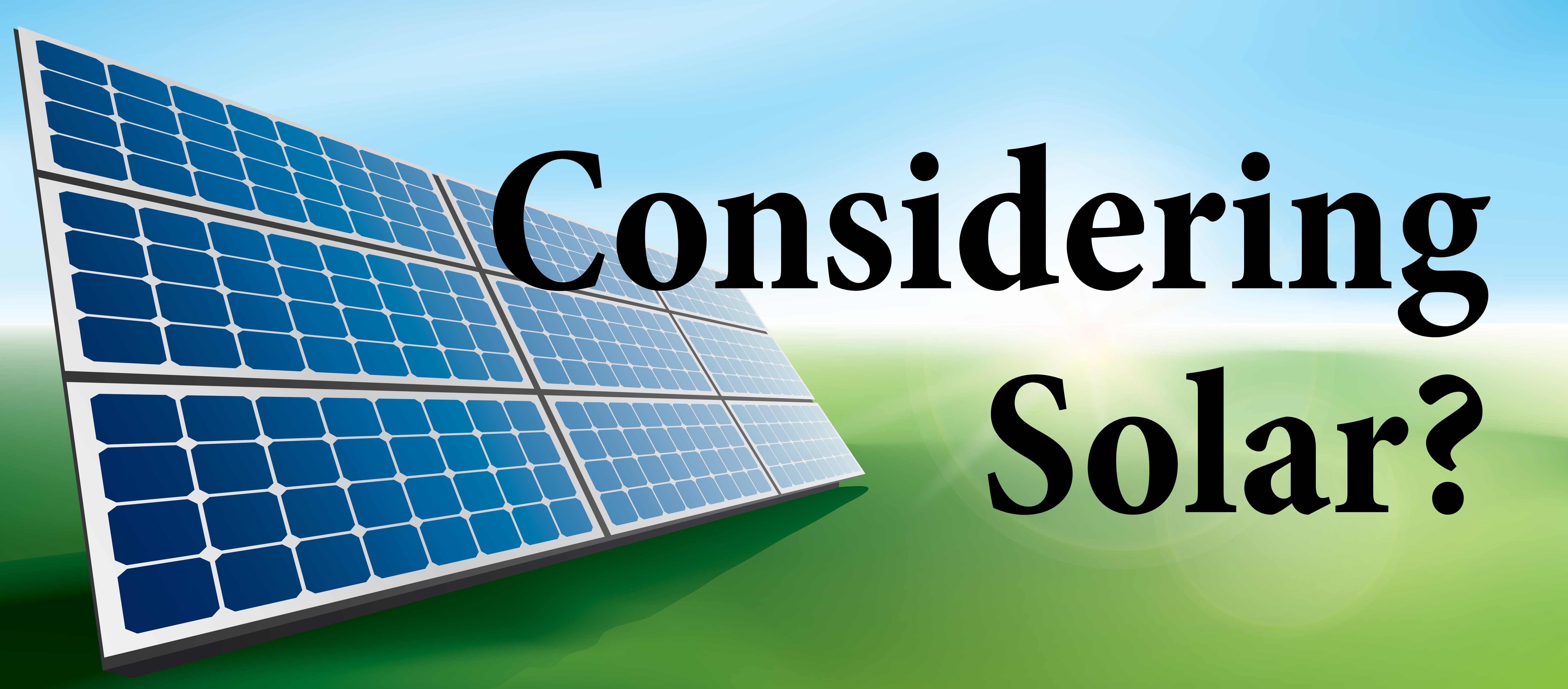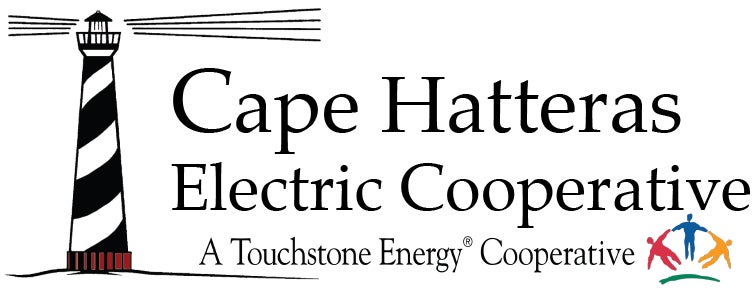
If you’re considering solar power, we’re here to help. More and more of our members are interested in pursuing home solar installations, and as your local energy partner, we want to work with you to navigate the process.
How does home solar really work?
Whether you are interested in mounting solar panels to your roof or would like to add ground-mounted solar to your property, the sunlight-to-electricity conversion process works the same:
1. During daylight hours on low-cloud days, sunlight will shine on your panels. These panels are often called photovoltaic or PV panels because they support the photovoltaic process of absorbing and converting light to electricity.
2. The newly created electricity must be converted from direct current (DC) to alternating current (AC), which is the kind of current used in the United States because it can be "stepped up" to support traveling long distances and "stepped down" to an appropriate voltage for household appliances. The conversion to alternating current occurs in a device called an inverter.
3. In most cases, the newly formed alternating current runs through your home's electrical panel and powers some of your home energy needs. If your home needs more energy than the solar panels can provide, you will draw metered power from the grid, just as you would have before installing panels.
Frequently Asked Questions:
Whether you're just getting started or have thoroughly researched solar energy, give our office a call (252-995-5616) to review your home's energy history and discuss your goals before committing to a solar contract.
Unfortunately, we've seen instances in our community where members have been misled and misinformed because of inaccurate information. We're here to be your energy partner throughout the process, helping you to arrive at a decision right for your home and personal goals.
Another thing we always recommend is to improve the energy efficiency of your home. A more efficient home stretches your energy dollar further, and you'll recover the expense of your solar investment more quickly.
Depending upon the size and efficiency of your system and home, most homeowners see savings on their electric bill. Some solar companies make claims that you'll never have to pay an electric bill again, and we caution this is simply not true. Your home requires electricity even if the sun is not shining, including at night and on cloudy days, which means you will continue to draw electricity from the grid and be billed monthly based on your home energy use and any basic facilities charges.
CHEC members with home solar are still connected to the grid. Because we are an at-cost, not-for-profit cooperative energy provider, standard charges that all members pay, to ensure the reliability and safety of the electric grid for all, will stay on your bill, no matter how much energy your home may produce. Without this structure, grid costs would unintentionally be shifted to members for whom home solar is out of reach for financial, geographic or other reasons.
A great resource for checking your potential production based on your address and system size can be found at PVWatts Calculator.
This is a common question and a concept often clouded by misinformation. The best thing you can do is contact us to determine if solar is the right fit for meeting your financial goals.
Each of North Carolina's 26 electric cooperatives is independent and governed locally by an elected board of directors, which is responsible for setting and reviewing policies. This means our policies may differ from our neighboring co-ops because of our local circumstances and needs.
We connect the solar array to the home's existing meter and you will use what is produced, in real time, to offset electricity used from the grid. With this option, you are receiving the benefit of the full retail rate for energy that you produce and use yourself. CHEC does not compensate for any excess energy that is pushed back onto the grid with this option. Energy production/use is calculated in real-time.
In order to avoid subsidization of members with solar, by members without solar, it is necessary to charge a solar facilities charge to recoup some of the fixed customer and distribution costs that are offset by a member's solar production. The solar facilities charge varies depending on service type and size of the array.
Bottom line - Because policies vary, we encourage you to please contact us to make sure you have all the facts before purchasing a solar installation. Solar companies may not be familiar with our co-op's policies, and we don't want anyone to enter into an agreement with misinformation.
Ground-mounted and rooftop solar are both home solar solutions, and their differences are highlighted below for your consideration.
| Rooftop | Ground-Mounted |
| Most commonly installed; does not require expansive amounts of land and eliminates risk of tampering. | Can place the array in an optimal location. |
| Typically, less expensive than ground-mounted arrays. | Easy to clean panels and make any needed repairs. |
| Utilizes unused space. |
Please note that you will need to obtain a permit from Dare County prior to starting your installation. For ground-mount systems, the County requires that the bottom of the panels be at base-flood +1ft (around 9ft above sea level). The elevation of your lot will affect your project plans. Dare County's Planning Department can be reached at (252) 475-5878.
Yes! We support all energy solutions that are a fit for our members, uphold the safety and reliability of our grid and improve the diversity of our resources while also ensuring that costs are not shifted to members without home solar panels. Our nation's electric grid is shifting from a model where large, centrally located generating plants produce power and push it to the far corners of the grid, to a model that incorporates more distributed energy resources and technologies, like home solar. This is an exciting time in our industry, and we want our members to make a choice that is right for them. If your choice leads you to a solar installation, we ask that you please let us know and work with us so you can make informed decisions and incorporate your new installation into our plans for managing electric traffic across our grid.
For a list of current solar and renewable incentives visit DSIRE for state incentives and Energy Star for federal incentives.
You are welcome to shop around and choose a solar installer that fits your needs and budget. CHEC requires that your solar installer hold the NABCEP PV Installation Professional certificate. They must also be able to have a Professional Engineer stamp the agreement. We recommend getting several quotes before signing a contract.
Yes.
Available in conjunction with any of the Cooperative's residential or commercial rate schedules, where renewable generation is connected on the customer side of the meter in parallel with the Cooperative's electric system and is designed to offset a portion or all of the consumer's electrical requirements normally supplied by the Cooperative.
Solar Facility Charges:
Residential
Up to 10kW of Generation $28.00/month
Over 10kW of Generation $34.00/month
Commercial
Up to 10 kW of Generation $40.00/month
Over 10 kW of Generation $62.00/month
How to get started
Before your solar project is started, you will need to review and fill out the following Interconnection Documents:
Interconnection Standards (read this and share with your installer)
Interconnection Application (fill this out first and submit with a detailed sketch of your project)
Interconnection Agreement (fill this out and have it stamped by an NC Registered Professional Engineer)
There is a $250 application fee due with all interconnection applications. The cooperative also requires you to produce a copy of your homeowners liability insurance, showing at least $100,000 in coverage.
For more questions, please contact Laura Ertle at (252)995-5616 or laurae@chec.coop.
